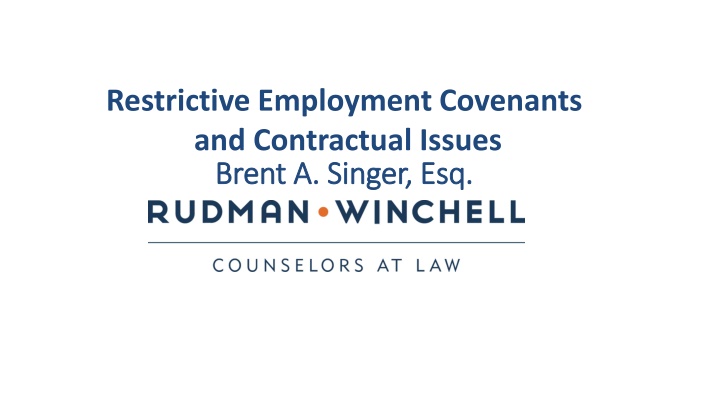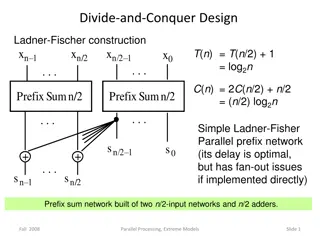
Key Insights on Employment Covenants and Contractual Issues in Maine
Gain valuable insights into restrictive employment covenants, noncompete agreements, and legal statutes in Maine, including obstacles to enforcement, equal pay regulations, and more. Understand the implications for employers and employees to navigate this complex legal landscape effectively.
Download Presentation

Please find below an Image/Link to download the presentation.
The content on the website is provided AS IS for your information and personal use only. It may not be sold, licensed, or shared on other websites without obtaining consent from the author. If you encounter any issues during the download, it is possible that the publisher has removed the file from their server.
You are allowed to download the files provided on this website for personal or commercial use, subject to the condition that they are used lawfully. All files are the property of their respective owners.
The content on the website is provided AS IS for your information and personal use only. It may not be sold, licensed, or shared on other websites without obtaining consent from the author.
E N D
Presentation Transcript
Restrictive Employment Covenants and Contractual Issues Brent A. Singer, Esq. Brent A. Singer, Esq.
26 MRS Section 599-A (Refresher course) $51,520* Later of 6 months or 1 year Disclose requirement before job offer* 3 Business days to consider* Penalty of not less than $5,000.00
26 MRS Section 599-A Definitely a noncompete agreement under the statute: Can t work for 1 year within 50 miles of former employer s location; Can t work for 1 year as an optician; Can t work for 1 year as an optician within 50 miles of former employer s location. Probably a noncompete agreement under the statute: Can t for 1 year compete directly or indiretly against the former employer. Not a noncompete agreement under the statute: Can t solicit clients of the former employer; Can t use confidential information of former employer for benefit of himself or others.
26 MRS Section 599-A Obstacles to enforcement of noncompete agreements: Reputation in the community $10,000 to $40,000 Facts are hard to prove Tough to collect Interstate complications Judges still will not enforce if deemed unreasonable in duration or territory
26 MRS Section 599-B An agreement between employers that restricts one from hiring the other s employees or former employees is unenforceable (even if entered into before 9/19/2019)
26 MRS Section 599-B Merely entering into such a restrictive employment agreement on or after 9/19/2019 is unlawful and exposes each employer to a fine of not less than $5,000, enforceable by Maine DOL. Enforcing or threatening to enforce such a restrictive employment agreement is also unlawful and exposes the employer to a fine of not less than $5,000, enforceable by Maine DOL.
26 MRS Section 628-A Since 1965, 26 MRS Section 628 ( Equal Pay ) has provided that an employer may not discriminate between employees on the basis of sex by paying wages to any employee in any occupation in this State at a rate less than the rate at which the employer pays any employee of the opposite sex for comparable work on jobs that have comparable requirements relating to skill, effort and responsibility. 54 years and two generations later, the Legislature found that despite requirements regarding equal pay having been part of the laws of Maine since 1965, wage inequality is an ongoing issue in the State. The Legislature further found that an employer s knowledge of a prospective employee s compensation history is directly related to the practice of basing compensation decisions on compensation history, and when employers base compensation decisions on compensation history of a prospective employee, it directly perpetuates this wage inequality.
26 MRS Section 628-A So in 2019, the Legislature enacted 26 MRS Section 628-A, Compensation history inquiry prohibited. Section 628-A provides that until an employer has made a firm offer of employment that includes all terms of compensation, the employer may not use or inquire about the compensation history of a prospective employee from the prospective employee or a current or former employer of the prospective employee (emphasis added).
26 MRS Section 628-A May be enforced by Maine DOL or the individual affected by a violation of the statute, who may seek compensatory damages, and in any event is entitled to unpaid wages, interest, costs of suit including a reasonable attorney s fee, and an additional amount equal to twice the amount of unpaid wages. Employer is also liable for a forfeiture of not less than $100 nor more than $500 for each violation.
26 MRS Section 628-A How does one prove an employer used compensation history of a prospective employee before making the firm offer of employment including the rate of compensation? How does one prove how much one would have been paid had the employer not violated the statute? What would compensatory damages include? Obviously something more than the unpaid wages typically means mental anguish, pain and suffering, and loss of enjoyment of life.
26 MRS Section 628-A Potential nightmare scenario: Asset deal; 500 employees; Buyer has Seller provide it with a list of employees of Seller, together with their individual current rates of pay, and has Seller represent and warrant that the list is true in all material respects; Seller terminates the employment of its employees upon Closing; Buyer makes offers to and hires 425 of the employees after Closing; and Buyer starts them at same compensation as their former employer.
26 MRS Section 628-A 500 violations of Section 628-A, $250,000 fine? 425 plaintiffs suing for unpaid wages? 425 plaintiffs suing for compensatory damages, interest, and attorneys fees? Better practice: Get only bulk information from Seller; or if not, make sure Buyer can prove that the person doing the hiring never saw the Seller s list of employees with their individual compensation histories.






















